Premium Only Content

Bertrand Russell: One World Government or the 'Extinction of Humanity' The War Used to End Wars Lie
Bertrand Russell: One World Government or the 'Extinction of Humanity' The War Used to End Wars Lie
-
Causing Wars to use as Justification for a One World Government to End Wars.
-
That is exactly how the Ruling Elite Psychopaths operate.
-
War is about World Domination. A One World Government is the Endgame for the Globalist Ruling Elite.
-
Most Wars are in fact a Staged Event caused through False Flags. Problem, Reaction, Solution.
-
The Enslavement of Humanity is the SOLUTION for the Ruling Elite.
-
May 15, 2013
-
http://truthstreammedia.com/bertrand-... Lord Bertrand Russell (Fabian socialist, Royal Society, peacenik) threatens that without a single global government, human life could be extinguished under the threat of (nuclear) war or return to uncivilized barbarism; yet without the power of an identifiable external enemy, people are psychologically adverse to unifying under such a one world system. Ergo, advocates and architects of One World are looking for a compelling enemy to achieve global cohesion and submission to a planetary authority... --- From: The Impact of Science on Society (1952): "Communications have been hitherto the chief factor limiting the size of empires. In antiquity the Persians and the Romans depended upon roads, but since nothing traveled faster than a horse, empires became unmanageable when the distance from the capital to the frontier was very great. This is on the point of disappearing with the improvement of the long-range bomber. There would now be no technical difficulty about a sing world-wide Empire. Since war is likely to become more destructive of human life than it has been in recent centuries, unification under a single government is probably is probably necessary unless we are to acquiesce in either a return to barbarism or the extinction of the human race." "There is, it must be confessed, a psychological difficulty about a single world government. The chief source of social cohesion in the past, I repeat, has been war: the passions that inspire a feeling of unity are hate and fear. These depend upon the existence of an enemy, actual or potential. It seems to follow that a world government could only be kept in being by force, not by the spontaneous loyalty that now inspires a nation at war." p. 26
-
FAIR USE FOR EDUCATIONAL PURPOSES
-
Mirrored From:
https://www.youtube.com/@TruthstreamMedia
***
BERTRAND RUSSELL:
-
THE IDEA OF A WORLD GOVERNMENT
-
. The British Debate on the League of Nations.
-
(Bloody Lies. The Attack Against National Sovereignty was a War of the Ruling Elite, and is the True War Against All)
-
https://www.researchgate.net/publication/367205674_BERTRAND_RUSSELL_THE_IDEA_OF_A_WORLD_GOVERNMENT
-
The idea of a world government represented one of the most relevant and recurring aspects of Bertrand Russell’s political thought since the First World War. In 1916 (he was then a philosophy lecturer at Trinity College, Cambridge) Russell published an article entitled “War as an Institution”: a lasting peace – he pointed out – could be ensured only by establishing a “world-federation” because so long as there were many sovereign States, each with its own army, there would be war; at the same time, he was realistically aware that this idea was remote, so much so that – he further argued – “devotion to the nation” was perhaps “the deepest and most widespread religion of the present age”1.
-
The following year, in the article “National Independence and Internationalism” published by the American magazine The Atlantic Monthly, he criticized the concept of “absolute [national] sovereignty”, namely the main cause of international anarchy. Hence the need to transfer the traditional model of natural law from the individual level to the interstate one through the establishment of an international government, as individual countries would still be in a sort of belligerent state of nature.
-
“The claim to absolute sovereignty” – wrote Russell – entailed that “all external affairs” were to be regulated “purely by force” and this was nothing but “the war of all against all which Hobbes [had] asserted to -
***
Russell made his voice heard on the League of Nations; if within an international body (with reference to the Genevan institution) each member represented his country – he affirmed in The Prospects of Industrial Civilization (1923) – it was likely to reproduce in its debates “the diplomatic tug of war between the nations”
-
6. In the spring of 1920, Russell highlighted the historical importance of the Russian Revolution: “The Bolsheviks [...] had at any rate proved that Socialism [was] compatible with vigorous and successful State” and what they were doing was of “even greater importance for the future of the world than what [had been] accomplished in France by the Jacobins” because their operations were “on a wider scale” and their theory was “a more fundamental novel”
-
7. Despite his progressive criticism of Bolshevism, Russell believed that the Great War had signaled the end of traditional European liberalism and had made clear the need to replace capitalism, with its inherent competition and strife, with international socialism. Therefore, in 1923 he moved towards the Labour Party, which had supported the peace negotiations, and this decision marked his separation from the Liberals, the party that his grandfather, John Russell, had twice led as Prime Minister. In the first half of the 1920s, his idea of a world government was influenced more by socialist internationalism than by federalist thought; international socialism could have favoured the establishment of a “world government” by which to pursue two fundamental aims: “the prevention of war” and “the securing of economic justice between different nations and different populations”8. On 3 April 1924, at the League for Industrial Democracy (New York), he argued that a “world government” could be formed not by a “voluntary federation”, but through “an extension of the US financial empire” over the American continent, the whole of Western Europe and also the Near East; however, this would have been “illiberal and cruel” since it crushed trade unionism9. Moreover, in a series of four writings published by the Jewish Daily Forward in the summer of 1927, he hoped for a “central authority to control the whole world”, an achievable aim initially through the power of American fi-
nance and then the ideals of socialism; once world unity was realized,
-
socialism would become inevitable, since the alternative was the destruction of mankind: “If our civilisation continues for much longer to pursue the interests of the rich, it is doomed”; and he argued further:
-
“I do not desire the collapse of civilisation, because I am socialist”
-
(WHAT A CROCK OF SHIT. COMMUNISM IS RULE BY THE RICH, AND EARL BERTRAND RUSSELL WAS ONE OF THEM)
-
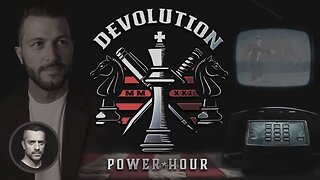 1:38:47
1:38:47
Badlands Media
1 day agoDevolution Power Hour Ep. 387: Trump, Epstein, Durham Mysteries, and North Korea Ops
104K26 -
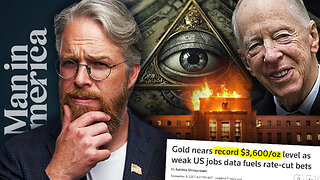 1:05:23
1:05:23
Man in America
18 hours agoSoaring Gold Exposes the Imminent Crash of the Old System w/ John Perez
61.6K11 -
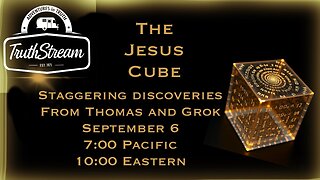 2:42:40
2:42:40
TruthStream with Joe and Scott
18 hours agoTHOMAS AND GROK: AI, Bible decodes, The JESUS Cube live 9/6 #487
50.7K10 -
 2:34:46
2:34:46
BlackDiamondGunsandGear
13 hours agoGet Prepped / After Hours Armory / LIVE SHOW /
33.1K2 -
 2:01:39
2:01:39
Tundra Tactical
11 hours ago $11.29 earned🛑LIVE NOW!! This spits in the face of the Second Amendment.🛑
39.9K8 -
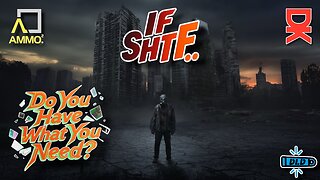 2:34:46
2:34:46
DLDAfterDark
10 hours ago $4.97 earnedIt's SHTF! Do You Have What You Need?? Let's Review Items & Priorities
28.2K6 -
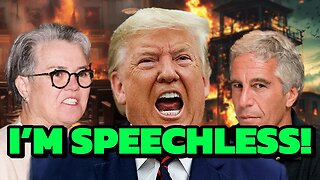 28:58
28:58
Stephen Gardner
11 hours ago🚨Explosive allegations: Rosie O’Donnell connects Trump to Epstein scandal!?
45.5K85 -
 9:22:47
9:22:47
SavageJayGatsby
2 days agoSpicy Saturday | Let's Play: Grounded
54.1K2 -
 2:06:27
2:06:27
MattMorseTV
13 hours ago $55.66 earned🔴Vance just went SCORCHED EARTH.🔴
134K199 -
 46:41
46:41
The Mel K Show
18 hours agoMel K & Corey DeAngelis | The Hopelessly Captured Teacher’s Unions: Biggest Threat to Our Children & Future | 9-6-25
40.3K6